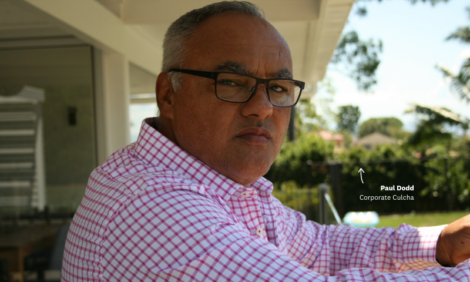
Learning from Indigenous Business Month with Corporate Culcha

This October marked the seventh annual Indigenous Business Month; an initiative organised and overseen by MURRA Indigenous Business Program alumni. Throughout last month, enterprises, small businesses and not-for-profit organisations celebrated the theme, Powering the Indigenous Economy. This topic acknowledged not only the economic contributions of Australia’s Indigenous businesses, but also the continuing need to empower First Nations entrepreneurs to become leaders in their field and role models in their communities. And to discuss what organisations can do to support this mission, we sat down with Paul Dodd of Corporate Culcha – an Indigenous engagement, training and workplace development organisation based in Bundjalung Nation (Pottsville, NSW).
Paul founded Corporate Culcha in 2007 to change the conversation in corporate environments by introducing cultural diversity training. Corporate Cultcha became the first Supply Nation business listing – Australia’s largest database of verified Indigenous businesses – to win major contracts with some of the country’s largest organisations. This rapid growth enabled new ventures, expanding Corporate Culcha’s mission by giving back to remote Indigenous communities through programs like mental health education and financial literacy training. And after decades spent working with organisations to create more inclusive and accessible opportunities for Aboriginal and Torres Strait Islander peoples, Paul shared some of his learnings below.
What is the significance of Indigenous Business Month to you?
Paul: Recognising and celebrating First Nations businesses throughout Indigenous Business Month and all year round is important for so many reasons. Supply Nation did some research into the power of Indigenous procurement, revealing that for every dollar spent with an Aboriginal and Torres Strait Islander business, the economic and social return going back into our communities is $4.40 – over four times the original investment.
Recognising this opportunity to support Indigenous businesses and jobs growth, the government introduced its procurement policy in 2015, which was a real game-changer for us. Essentially, it committed three percent of its annual spend with Indigenous businesses, equating to over five and a half-billion dollars. As a result, 40,000 jobs were created for Aboriginal and Torres Strait Islander people between 2018 and 2019. And that’s just three percent of government spending. This isn’t just good for our communities, but the economy as a whole.
The more we can talk about the good that comes with supporting First Nations businesses – through calendar events like Indigenous Business Month – the more likely these policies will positively impact the corporate sector.
What can organisations do to better support Indigenous businesses?
Paul: There are two things Indigenous businesses need the most support with: financial management and digitisation. I once had a digital mentor who said, “No data, no decision.” He meant that without proof – like financial records and reports, analysis and all those other things that, nowadays, software enables us to do – we’re unable to make informed choices that lead to sustainable outcomes. So equipping Indigenous businesses with those resources and tools can be incredibly empowering. Even if the digitisation journey is incremental, it still makes a difference. After all, it’s an evolution, not a revolution.
There’s also space with this kind of support for organisations to nurture their relationships with First Nations entrepreneurs through exercises like mentoring and role modelling. Giving them the technology or even a big procurement contract is great, but there’s a responsibility to build them up to those opportunities and make sure they can use the tools or fulfill the agreement with confidence.
Tell us, what are you most proud of in the work you do?
Paul: I’m proud of where Corporate Culcha started and where it is now. We went from having three consultants on our books 14 years ago to employing 25 people today – 95 percent of whom are of Aboriginal and Torres Strait Islander descent. By developing capabilities that support Mob, our work creates positive ripple effects in the communities we’re trying to help. And that’s what it’s all about at the end of the day.
For more information, head to the Indigenous Business Month website. To learn about and support more Indigenous-owned businesses, visit the Supply Nation business directory.
The post Learning from Indigenous Business Month with Corporate Culcha appeared first on Xero Blog.
Source: Xero Blog






